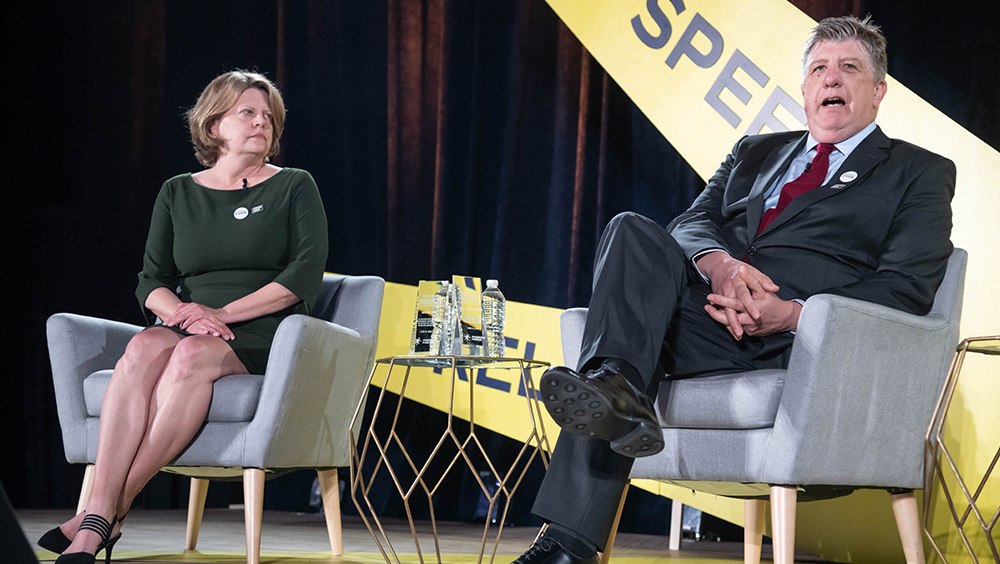News Executives Share the Fight to Bring Imprisoned Journalists Home

The number of journalists being detained around the world is the highest it’s been in 30 years, according to the Committee to Protect Journalists.
Two such reporters were honored at the 2023 Free Expression Awards as their families and colleagues fight to bring them home.
Wall Street Journal reporter Evan Gershkovich is in jail in Russia, facing up to 20 years in prison on espionage charges both the U.S. government and the Journal strongly deny. He was arrested while reporting for the Journal in Russia in March. It is the first time since the Cold War the regime has accused an American journalist of spying. His arrest has generated international outcry over threats to independent journalism.
Washington Post contributor and freelance journalist Austin Tice has been held captive in Syria since 2012. He was kidnapped at a checkpoint while reporting on the Syrian civil war. An award-winning freelance journalist and a veteran captain in the United States Marine Corps, Tice was covering the story for the Washington Post, CBS News and McClatchy.
Gershkovich and Tice, representing all journalists who are jailed or unjustly held around the world, were 2023 Free Expression Award honorees along with Russian opposition leader Alexey Navalny, the Brooklyn Public Library, and Futuro Media Group founder Maria Hinojosa.
In late 2022, a census by the Committee to Protect Journalists revealed that there were more than 360 journalists imprisoned worldwide, the highest figure since the CPJ began counting three decades ago.
Paul Beckett, Wall Street Journal Washington bureau chief, and Sally Buzbee, Washington Post executive editor, accepted 2023 Free Expression Awards on behalf of Gershkovich, Tice and all journalists who are jailed or unjustly held around the world.
During the program, they joined host Joie Chen in conversation about the risks journalists face reporting the news.
Why journalists face risks to report on the ground
When asked why the number of journalists who are threatened or detained has been increasing, Buzbee said more authoritarian governments are trying to suppress journalism, and news outlets are struggling to keep on-the-ground reporting going.
Fred Ryan, outgoing Washington Post publisher, told the Freedom Forum in an interview about the dangers: “Going into a war zone, conflict zone or very closed society is inherently risky for any journalist, but in many ways it’s the most important type of journalism because these are places where people on the ground don’t want the story to be told.”
Buzbee explained why journalists reporting from Ukraine to the West Bank to Syria take such risks. “There’s an absolute value to having real humans on the ground in a conflict zone to be able to uncover human rights abuses, to be able to actually bear witness to the people who are suffering from that conflict.”
“I think almost by definition [authoritarian regimes are] terrified of a free press because a free press is fundamental to free society,” Beckett said. “If we don’t know what’s happening there, that ignorance, that is trouble.”
“What people need to remember is how integral press freedom is to all of our other freedoms,” Gordon Fairclough, Wall Street Journal world coverage chief, told the Freedom Forum in an interview. “When a society loses the ability to question people in power and in authority, democracy is at risk.”
How to stand with Evan, Austin and all imprisoned journalists
When the conversation turned to what can be done to bring imprisoned journalists like Tice and Gershkovich home, Buzbee and Beckett both advised keeping pressure on the U.S. government.
Buzbee said Tice’s parents have continually put pressure on the U.S. government over three presidential administrations in the nearly 11 years he’s been held and have at times expressed their disappointment in the response.
In Evan’s case, Beckett said the government has been responsive and seems to be taking the situation seriously so far, but that it is likely to be a long road, so it’s important to keep focused. He added that another way Americans can help is to get to know these journalists and their work.
Buzbee described Tice’s unusual path to journalism from his background as a Marine serving in Iraq and Afghanistan to his time as a law student. She described his reporting about the conflict in Syria as courageous, intelligent and beautifully written.
Gershkovich, Beckett said, “wanted to go back to the land of his heritage.” Born to Jewish Russian parents who had fled the threat of persecution to the United States, he leveraged his Russian language skills and love for his parents’ homeland into an award-winning reporting career.
“Evan was doing what reporters do and what he did very well,” said Emma Tucker, Wall Street Journal editor-in-chief, in an interview with the Freedom Forum. “He was out there gathering news, providing an eyewitness account of what’s going on inside Russia.”
Knowing why these courageous journalists braved such danger to bear witness to stories of suffering makes it hard to turn away from their own struggles now.
The fight to bring Gershkovich and Tice both home – and to support free and independent journalism around the world – does and must continue.
Evan Gershkovich Release: Celebrate ‘Win’ for Free Press, Speech
Election Night 2024 Through the Lens: Press Capture Historic Event
Related Content
2025 Al Neuharth Free Spirit and Journalism Conference
All-Expenses-Paid Trip To Washington, D.C.
June 22-27, 2025
Skill-Building
Network Growing
Head Start On Your Future

